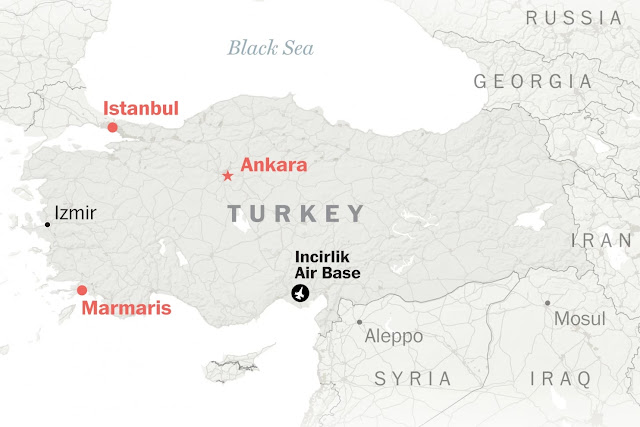[In
Istanbul and in Ankara — the Turkish capital, which saw the heaviest fighting
between pro- and anti-coup forces — life slowly began to return to normal
Saturday. Shops near Istanbul Taksim Square
By Erin Cunningham, Zeynep Karatas and
William Booth
But
by dawn, the once-menacing soldiers who had seized key roads and infrastructure
just hours before, could be seen surrendering to police on those same bridges, their
hands in the air as they stood in the early-morning light. More masses of
triumphant citizens, gleeful that the government had prevailed, came out to
gawk at stalled armored vehicles and take selfies with the police who had put
down the unpopular putsch.
The
police officers, for their part, basked in the glory as city residents treated
them like heroes. In the crowded Istanbul
“Turkey
Men
streamed through the city’s squares waving oversize Turkish flags — red, with
the white star and crescent associated with Islam — and chanting support for
the government.
“I
was out on the streets until 6 a.m. I was out with all of my family — there were
20, maybe 30 of us,” said Olgun Gunes, a 41-year-old Uskudar resident and
textile worker. “There was a war beginning last night, but we went to the
streets and took responsibility for our country.”
In
Istanbul and in Ankara — the Turkish capital, which saw the heaviest fighting
between pro- and anti-coup forces — life slowly began to return to normal
Saturday. Shops near Istanbul Taksim Square
But
things felt different, many residents said.
Local
muezzins, those appointed to perform the Muslim call to prayer, led sermons
from the early morning and into the evening, on orders of the Religious Affairs
Directorate. On televisions, which were switched on everywhere, there was news
of arrests of coup plotters, purges of judges and a tense standoff at a
military headquarters in Ankara
Flights
to and from Istanbul Ataturk Airport Ankara
In
Istanbul
In
the up-and-coming Besiktas neighborhood, shops that residents had flooded the
night before in a last-minute bid to stock up on key supplies were also being
reopened. But only a few people were out on the streets.
Sedat
Demircan, 57, retired from foreign trade business, was out looking for fresh
bread.
“I
want Recep Tayyip Erdogan to go, but not like this,” he said. “Every time there
is a coup, the country goes back 10 years. The economy suffers.”
Hakan
Sengezen was at his shop, where he sells purses, luggage and backpacks. He said
the streets were filled with rumors about who was behind the coup. Sengezen
said he wasn’t sure what to think.
“I
do not want a coup,” he said. “Every time there is a coup the country goes back
10 or 20 years, in terms of the economy, in terms of security. I don’t want the
military to rule. They interfere with everything. They institute curfews; they
interfere with how people dress.”
Gizem
Oktay, 23, was at a party with friends in the Taksim district when news of the
coup broke and everyone rushed home. Her father is an officer in the Turkish
army.
“When
I got back to the barracks, the soldiers were waiting at the ready at the
entrance. They rushed us in,” she said. “It was fairly calm here, but in the
morning the police came and are not allowing any entry or exit.”
Several
thousand people rallied in Taksim Square
Police
vehicles with water cannons stood at the entrance to the square, and earlier in
the evening, families pushed strollers, and a mangy puppy romped in the
manicured grass. Young men — some with selfie sticks — scaled the monument in
the square, where revelers had stuck a Turkish flag in the hand of the statue
of Mustafa Kemal Ataturk, founder of the modern Turkish republic.
“God
is great! God is great! God is great!” yelled a group of bearded men in white
robes and sandals – clothing typically worn by the religiously conservative. Standing
near them were women in tight jeans who clapped their hands, whistled and
chanted, “Turkey Turkey
The
crowds were diverse and included people who most likely are divided when it
comes to Turkey
One
man, who identified himself as Russell, said he came to the bustling downtown
shopping district to demonstrate support for Turkish democracy. “This is about
keeping our country away from military rulers. The people should be running Turkey Istanbul
“This
is not about Erdogan.”
He
was referring to Erdogan’s call to Turks to take to the streets in a show of
support.
The
Turkish leader nevertheless appeared to have a large number of supporters at
the rally in Taksim, as well as at another celebration at Istanbul
Booth
reported from Jerusalem Istanbul
Read
more


